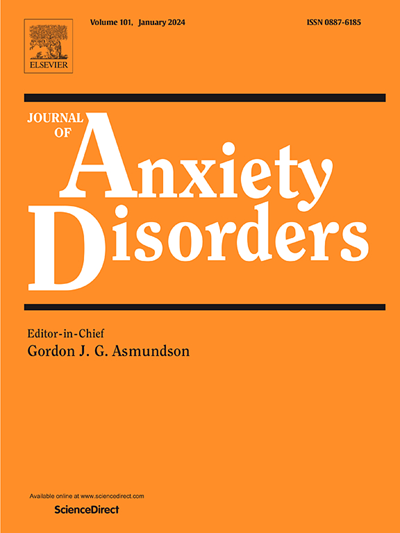评估社交焦虑障碍(SAD)个体的执行功能:一项系统的文献回顾和荟萃分析
IF 4.5
2区 医学
Q1 PSYCHIATRY
引用次数: 0
摘要
社交焦虑障碍是一种普遍的临床障碍,其特征是对一种或多种社交场合的强烈恐惧和/或回避,并与执行功能表现的缺陷有关。然而,方法上的差异和结果的混杂使得很难从个别研究中得出明确的结论。目前的系统回顾和荟萃分析整理了49项研究的结果,以检验社交焦虑障碍与一生中执行功能之间的联系。研究结果显示,社交焦虑个体在执行功能(r = - 0.15),特别是认知灵活性(r = - 0.20)、抑制控制(r = - 0.18)和整体执行功能(r = - 0.17)方面的表现明显差于健康对照组或低社交焦虑组。工作记忆与社交焦虑无显著相关性(r = - 0.06)。此外,测量类型(自我报告vs认知任务)调节了社交焦虑和执行功能之间的关系。虽然年龄并没有调节整体关系,但执行功能的各个领域与社交焦虑之间的关联在青少年和成年人之间存在差异,这可能反映了在整个生命周期中,这些领域之间不同的发展时间表。这些发现为我们理解社交焦虑症患者执行功能的发展提供了有价值的见解,并有助于形成新的策略或干预措施,以改善临床人群的日常功能。本文章由计算机程序翻译,如有差异,请以英文原文为准。
Assessing executive functioning in individuals with social anxiety disorder (SAD) across the lifespan: A systematic literature review and meta-analysis
Social anxiety disorder is a pervasive clinical disorder characterised by intense fear and/or avoidance of one or more social situations, and has been linked to deficits in executive functioning performance. However, methodological differences and mixed results have made it difficult to draw definitive conclusions from individual studies. The current systematic review and meta-analysis collated the results from 49 studies to examine the link between social anxiety disorder and executive functioning across the lifespan. Findings revealed that individuals with social anxiety performed significantly worse than healthy controls or low social anxiety groups on measures of executive functioning (r = -.15), specifically cognitive flexibility (r = -.20), inhibitory control (r = -.18), and global executive functioning (r = -.17). No significant association was evident between working memory and social anxiety (r = -.06). In addition, the type of measure (self-report vs cognitive task) moderated the relationship between social anxiety and executive functioning. Although age did not moderate the overall relationship, the association between the individual domains of executive functioning and social anxiety differed between youth and adults, which may reflect the different developmental timelines between the domains across the lifespan. The findings offer valuable insight into our understanding of the development of executive functions for individuals with social anxiety and could assist with forming new strategies or interventions to improve daily functioning in this clinical population.
求助全文
通过发布文献求助,成功后即可免费获取论文全文。
去求助
来源期刊

Journal of Anxiety Disorders
Multiple-
CiteScore
16.60
自引率
2.90%
发文量
95
期刊介绍:
The Journal of Anxiety Disorders is an interdisciplinary journal that publishes research papers on all aspects of anxiety disorders for individuals of all age groups, including children, adolescents, adults, and the elderly. Manuscripts that focus on disorders previously classified as anxiety disorders such as obsessive-compulsive disorder and posttraumatic stress disorder, as well as the new category of illness anxiety disorder, are also within the scope of the journal. The research areas of focus include traditional, behavioral, cognitive, and biological assessment; diagnosis and classification; psychosocial and psychopharmacological treatment; genetics; epidemiology; and prevention. The journal welcomes theoretical and review articles that significantly contribute to current knowledge in the field. It is abstracted and indexed in various databases such as Elsevier, BIOBASE, PubMed/Medline, PsycINFO, BIOSIS Citation Index, BRS Data, Current Contents - Social & Behavioral Sciences, Pascal Francis, Scopus, and Google Scholar.
 求助内容:
求助内容: 应助结果提醒方式:
应助结果提醒方式:


